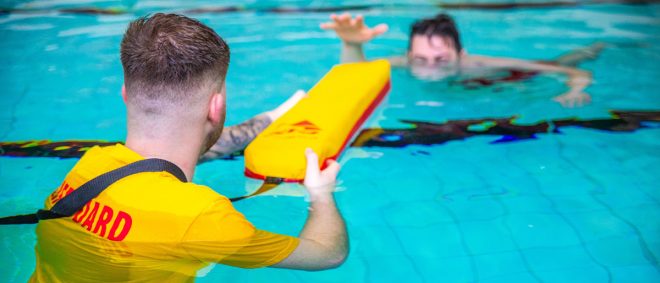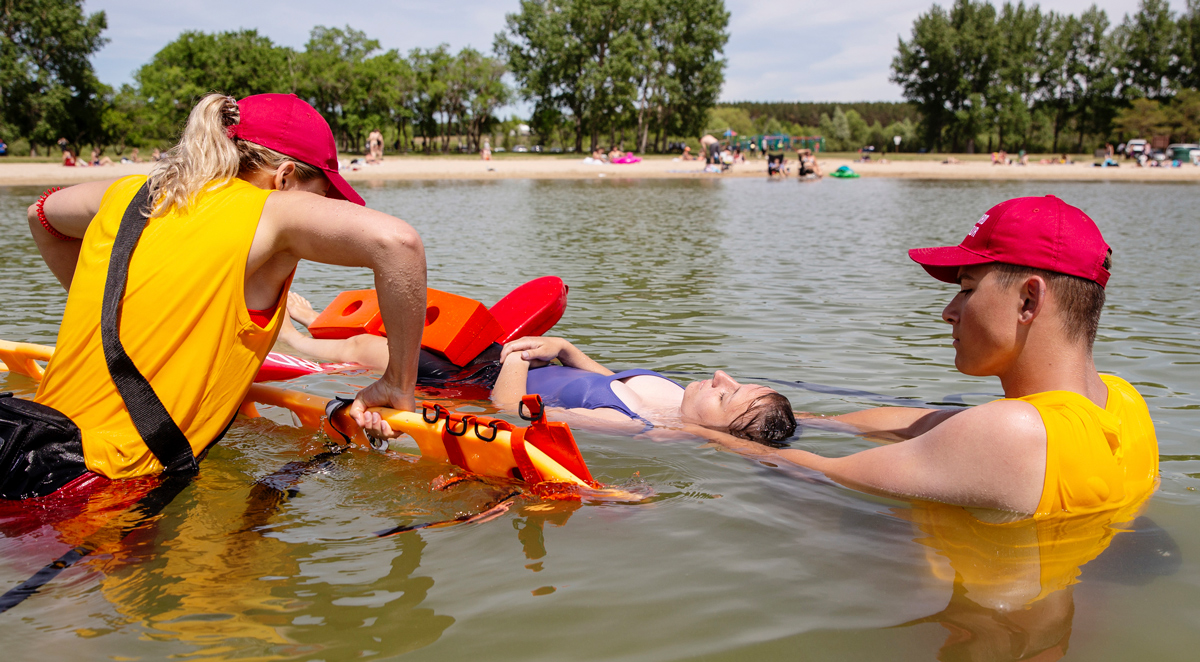Here’s a brief explanation of the term lifeguard. What you can imagine by that and, above all, what you can expect from this training. And what maybe not.
What Is A Lifeguard?
A lifeguard is someone who helps people in danger. Lifeguards are usually trained to save lives at beaches, pools, or rivers. They will always be prepared for a worst-case scenario and will never give up.
In other words: Lifeguards are professional rescuers and must be able to react quickly to any kind of situation. Training as a lifeguard the training is very intense and requires more than a year. First of all, it is necessary to train for a certain amount of time on a beach. You have to learn how to swim and to get yourself out of the water.
What Do Lifeguards Need To Know?
In lifeguard training, you are taught the laws and regulations. In addition, you have to be able to understand how to handle emergency situations. A lifeguard has to be able to react quickly. That is why it is very important that they have a calm and steady personality. The person fulfilling these criteria gets the lifeguard certification.
They must be able to react calmly and quickly if someone gets into trouble. If you are not willing to help people, you cannot become a lifeguard.
Where Do You Work?
Most lifeguards work at beaches, but there are also lifeguards who work in swimming pools. Lifeguards work all day long, and they must wear a uniform. When they work on a beach, they must wear a life jacket, a cap, a lifeguard vest, and a lifeguard belt. They must be able to swim and carry out their duties.
The lifeguard must have a valid driver’s license and a good driving record. If you want to become a lifeguard, you should have the best equipment. You should have a first aid kit with bandages, gauze, and other medical supplies.
Lifeguard Recertification
A lifeguard serving at a beach, a pool, or any other place like that must go through lifeguard recertification to continue his job. He must be certified by the state to ensure that he has the right skills and abilities. There are certain lifeguard courses that can help him do that.
One of those lifeguard courses is the CPR for Lifeguards course. It helps a lifeguard who wants to be a lifeguard in any state. It is important to note that this course is not only meant for lifeguards but also for the first responders who work in the medical field as well. They need to have the skills to deal with emergencies in their line of work.

Cpr Training
As you know, the average lifeguard is responsible for taking care of hundreds of people every single day. In order to be prepared for an emergency situation, a lifeguard must attend a CPR training course. This is a required course, and it is essential that you have it. It may seem like a lot of work, but it is actually pretty easy to learn. The Basics to start, you’ll need to decide which type of CPR training to get.
Types Of Cpr Training
There are two main types of training available. Self-Instructional Training and Classroom Training. Self-instructional training is the most convenient option. You can learn how to perform CPR at home by watching videos on YouTube. If you already know how to do CPR, this may be a good way to learn new techniques or improve your existing skills.
However, if you want to learn from a certified instructor, you should choose classroom training. Classroom training usually requires that you attend an in-person course. This will be the best option if you need to learn how to perform CPR on a person who is not breathing. It is also more likely to teach you what to do in specific situations.
Which Type Of Cpr Training Is Right For Me?
While classroom training is usually the best option, it is not always the most convenient option. Sometimes you may want to learn CPR on your own, and you may have a difficult time finding a class near you. If that’s the case, self-instructional training may be the right choice for you.
Final Words
Lifeguard certification is an important thing to working as a lifeguard and lifeguard recertification is important for continuing the job. The American Lifeguard Association (ALA) offers both. The training includes teaching skills for medical emergencies and CPR is one of these lifesaving training.
If you are searching for lifeguard recertification with CPR training then your search should end right here with ALA offering all types of lifeguard training in all major cities. Please do not hesitate to contact ALA for more information on our lifeguard training programs

